Cultural Analysis of 7-Eleven's Expansion in Brazil (BUS 301)
VerifiedAdded on 2022/10/01
|9
|2763
|464
Report
AI Summary
This report analyzes 7-Eleven's potential expansion into Brazil, examining the cultural elements that impact its business strategy. It begins with a brief overview of 7-Eleven, including its history, product offerings, and global presence. The report then delves into the cultural elements of Brazil, such as language, non-verbal communication, values, and business practices, highlighting their significance for a multinational corporation like 7-Eleven. It evaluates the importance of cultural literacy, discussing how understanding consumer behavior, workplace management, and cultural differences is crucial for success. The report emphasizes the challenges of operating in a new market and the need for adaptation. It concludes by summarizing key findings and reiterating the importance of cultural awareness for 7-Eleven's successful entry into the Brazilian market, referencing various academic sources to support its analysis.
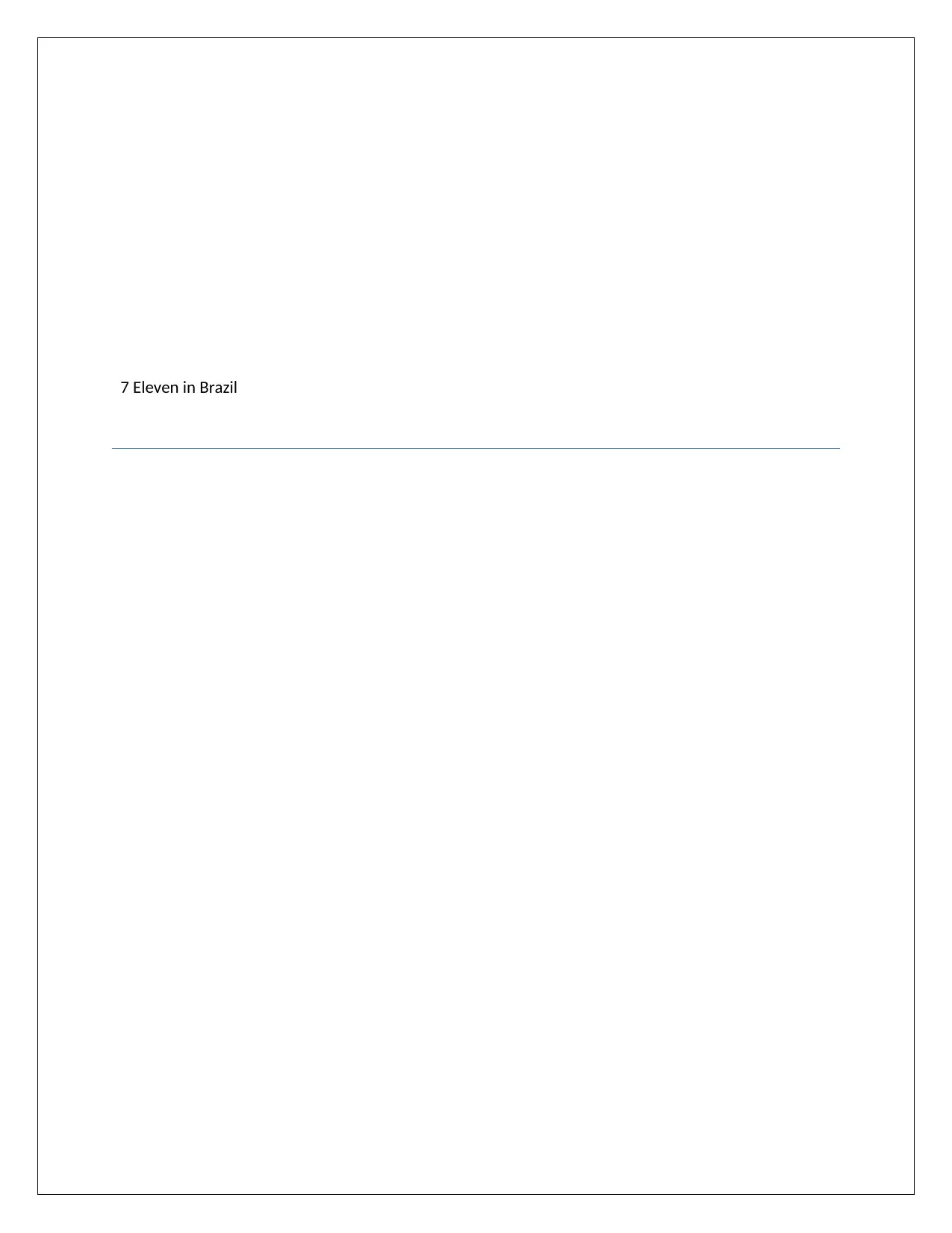
7 Eleven in Brazil
Paraphrase This Document
Need a fresh take? Get an instant paraphrase of this document with our AI Paraphraser
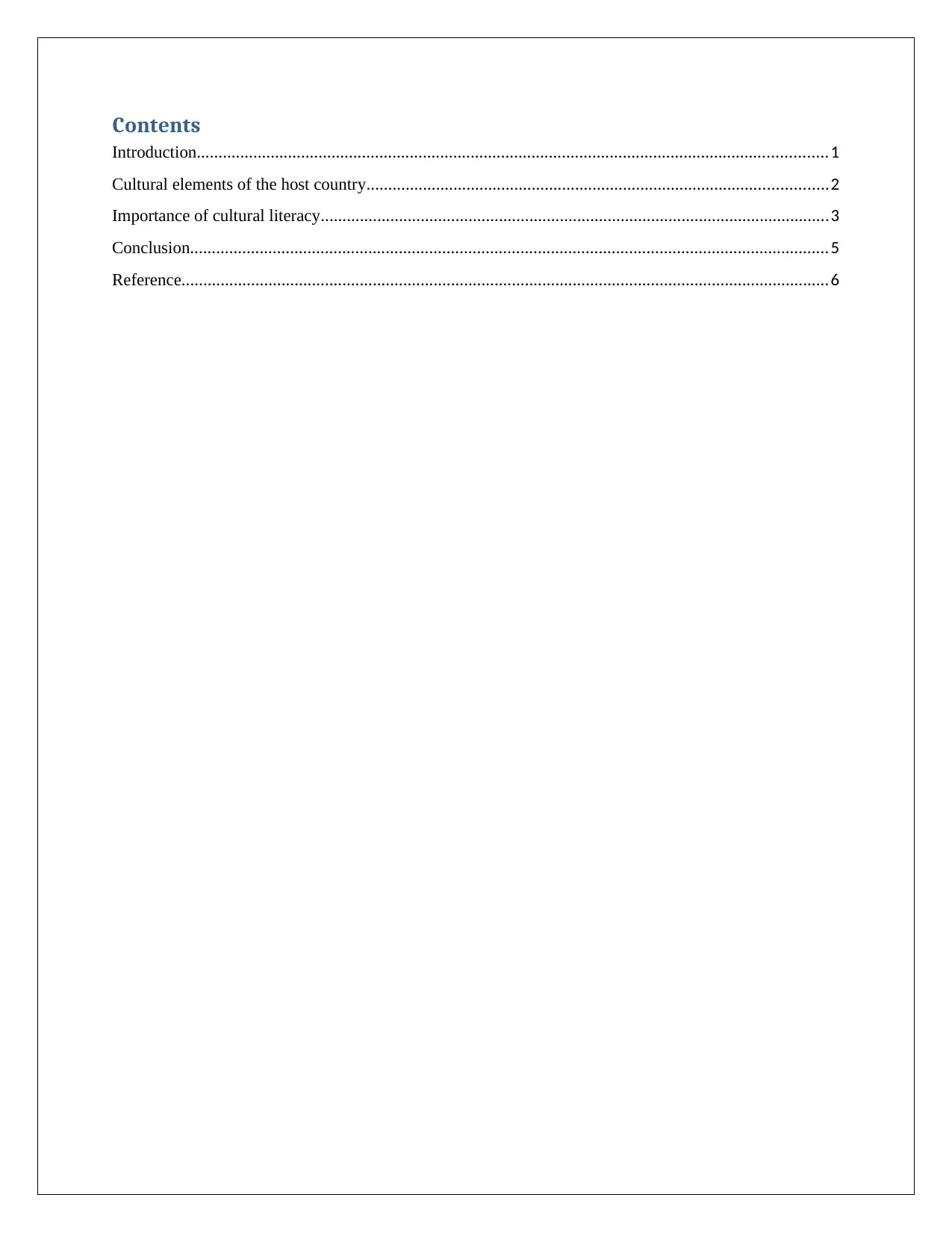
Contents
Introduction.................................................................................................................................................1
Cultural elements of the host country..........................................................................................................2
Importance of cultural literacy.....................................................................................................................3
Conclusion...................................................................................................................................................5
Reference.....................................................................................................................................................6
Introduction.................................................................................................................................................1
Cultural elements of the host country..........................................................................................................2
Importance of cultural literacy.....................................................................................................................3
Conclusion...................................................................................................................................................5
Reference.....................................................................................................................................................6
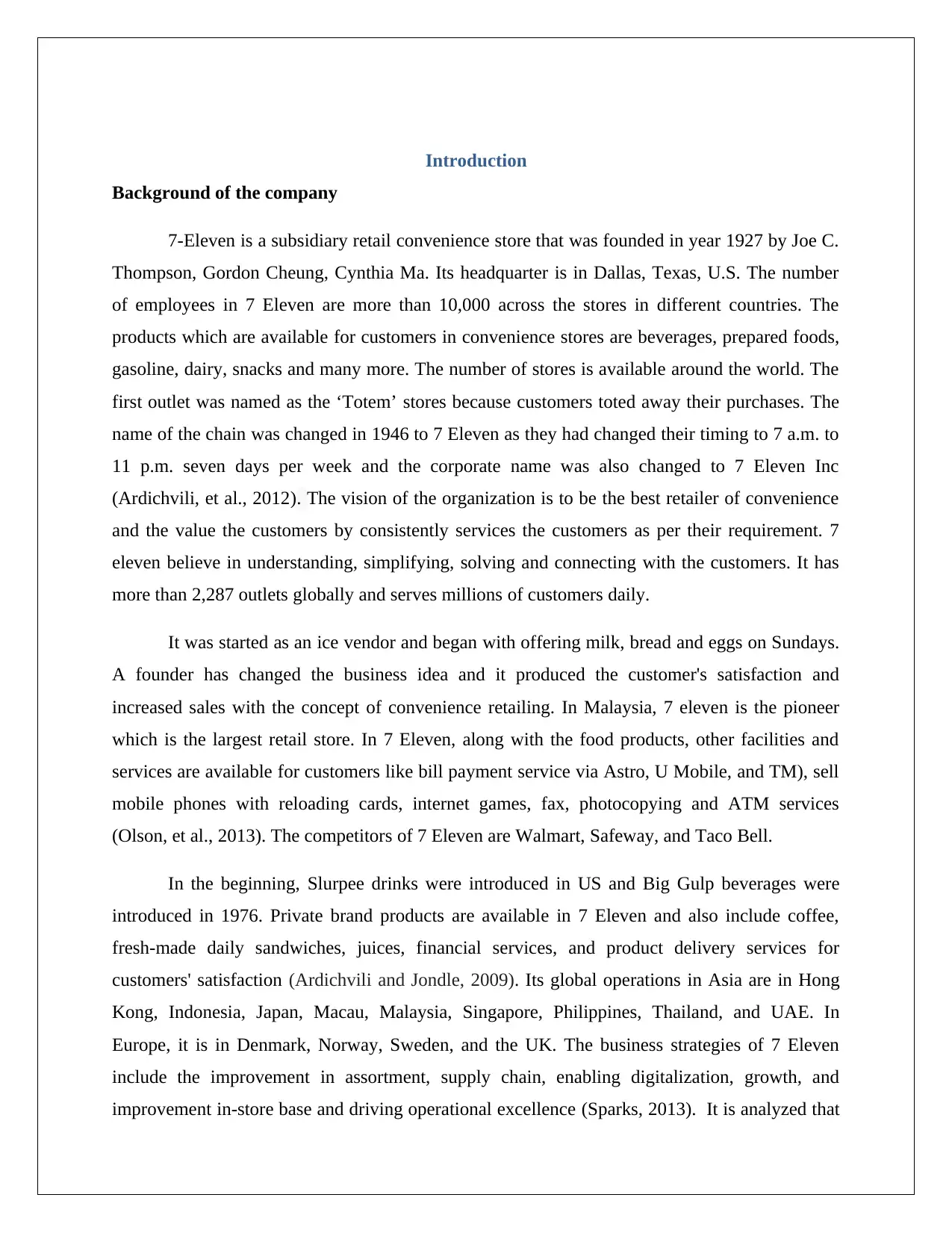
Introduction
Background of the company
7-Eleven is a subsidiary retail convenience store that was founded in year 1927 by Joe C.
Thompson, Gordon Cheung, Cynthia Ma. Its headquarter is in Dallas, Texas, U.S. The number
of employees in 7 Eleven are more than 10,000 across the stores in different countries. The
products which are available for customers in convenience stores are beverages, prepared foods,
gasoline, dairy, snacks and many more. The number of stores is available around the world. The
first outlet was named as the ‘Totem’ stores because customers toted away their purchases. The
name of the chain was changed in 1946 to 7 Eleven as they had changed their timing to 7 a.m. to
11 p.m. seven days per week and the corporate name was also changed to 7 Eleven Inc
(Ardichvili, et al., 2012). The vision of the organization is to be the best retailer of convenience
and the value the customers by consistently services the customers as per their requirement. 7
eleven believe in understanding, simplifying, solving and connecting with the customers. It has
more than 2,287 outlets globally and serves millions of customers daily.
It was started as an ice vendor and began with offering milk, bread and eggs on Sundays.
A founder has changed the business idea and it produced the customer's satisfaction and
increased sales with the concept of convenience retailing. In Malaysia, 7 eleven is the pioneer
which is the largest retail store. In 7 Eleven, along with the food products, other facilities and
services are available for customers like bill payment service via Astro, U Mobile, and TM), sell
mobile phones with reloading cards, internet games, fax, photocopying and ATM services
(Olson, et al., 2013). The competitors of 7 Eleven are Walmart, Safeway, and Taco Bell.
In the beginning, Slurpee drinks were introduced in US and Big Gulp beverages were
introduced in 1976. Private brand products are available in 7 Eleven and also include coffee,
fresh-made daily sandwiches, juices, financial services, and product delivery services for
customers' satisfaction (Ardichvili and Jondle, 2009). Its global operations in Asia are in Hong
Kong, Indonesia, Japan, Macau, Malaysia, Singapore, Philippines, Thailand, and UAE. In
Europe, it is in Denmark, Norway, Sweden, and the UK. The business strategies of 7 Eleven
include the improvement in assortment, supply chain, enabling digitalization, growth, and
improvement in-store base and driving operational excellence (Sparks, 2013). It is analyzed that
Background of the company
7-Eleven is a subsidiary retail convenience store that was founded in year 1927 by Joe C.
Thompson, Gordon Cheung, Cynthia Ma. Its headquarter is in Dallas, Texas, U.S. The number
of employees in 7 Eleven are more than 10,000 across the stores in different countries. The
products which are available for customers in convenience stores are beverages, prepared foods,
gasoline, dairy, snacks and many more. The number of stores is available around the world. The
first outlet was named as the ‘Totem’ stores because customers toted away their purchases. The
name of the chain was changed in 1946 to 7 Eleven as they had changed their timing to 7 a.m. to
11 p.m. seven days per week and the corporate name was also changed to 7 Eleven Inc
(Ardichvili, et al., 2012). The vision of the organization is to be the best retailer of convenience
and the value the customers by consistently services the customers as per their requirement. 7
eleven believe in understanding, simplifying, solving and connecting with the customers. It has
more than 2,287 outlets globally and serves millions of customers daily.
It was started as an ice vendor and began with offering milk, bread and eggs on Sundays.
A founder has changed the business idea and it produced the customer's satisfaction and
increased sales with the concept of convenience retailing. In Malaysia, 7 eleven is the pioneer
which is the largest retail store. In 7 Eleven, along with the food products, other facilities and
services are available for customers like bill payment service via Astro, U Mobile, and TM), sell
mobile phones with reloading cards, internet games, fax, photocopying and ATM services
(Olson, et al., 2013). The competitors of 7 Eleven are Walmart, Safeway, and Taco Bell.
In the beginning, Slurpee drinks were introduced in US and Big Gulp beverages were
introduced in 1976. Private brand products are available in 7 Eleven and also include coffee,
fresh-made daily sandwiches, juices, financial services, and product delivery services for
customers' satisfaction (Ardichvili and Jondle, 2009). Its global operations in Asia are in Hong
Kong, Indonesia, Japan, Macau, Malaysia, Singapore, Philippines, Thailand, and UAE. In
Europe, it is in Denmark, Norway, Sweden, and the UK. The business strategies of 7 Eleven
include the improvement in assortment, supply chain, enabling digitalization, growth, and
improvement in-store base and driving operational excellence (Sparks, 2013). It is analyzed that
⊘ This is a preview!⊘
Do you want full access?
Subscribe today to unlock all pages.

Trusted by 1+ million students worldwide
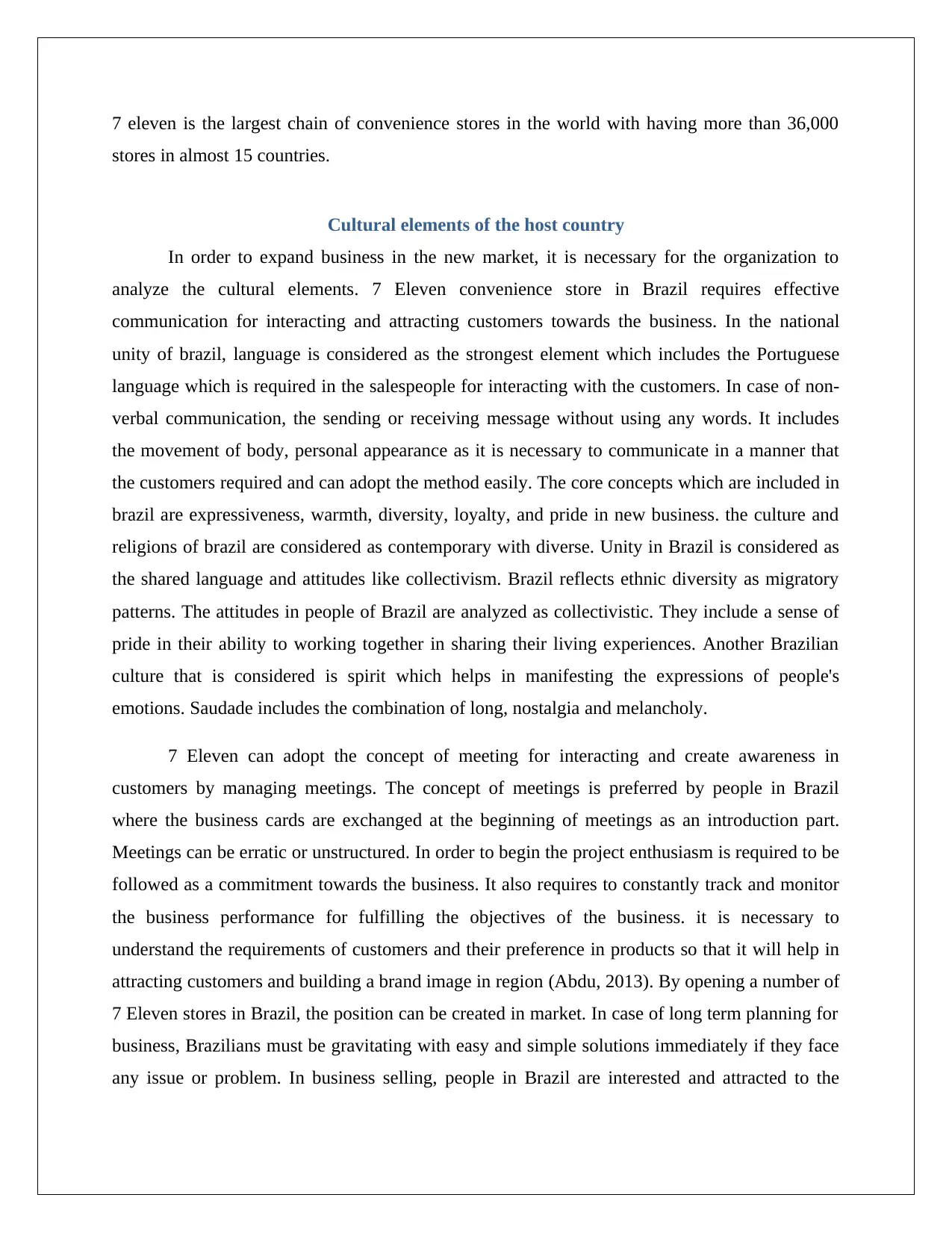
7 eleven is the largest chain of convenience stores in the world with having more than 36,000
stores in almost 15 countries.
Cultural elements of the host country
In order to expand business in the new market, it is necessary for the organization to
analyze the cultural elements. 7 Eleven convenience store in Brazil requires effective
communication for interacting and attracting customers towards the business. In the national
unity of brazil, language is considered as the strongest element which includes the Portuguese
language which is required in the salespeople for interacting with the customers. In case of non-
verbal communication, the sending or receiving message without using any words. It includes
the movement of body, personal appearance as it is necessary to communicate in a manner that
the customers required and can adopt the method easily. The core concepts which are included in
brazil are expressiveness, warmth, diversity, loyalty, and pride in new business. the culture and
religions of brazil are considered as contemporary with diverse. Unity in Brazil is considered as
the shared language and attitudes like collectivism. Brazil reflects ethnic diversity as migratory
patterns. The attitudes in people of Brazil are analyzed as collectivistic. They include a sense of
pride in their ability to working together in sharing their living experiences. Another Brazilian
culture that is considered is spirit which helps in manifesting the expressions of people's
emotions. Saudade includes the combination of long, nostalgia and melancholy.
7 Eleven can adopt the concept of meeting for interacting and create awareness in
customers by managing meetings. The concept of meetings is preferred by people in Brazil
where the business cards are exchanged at the beginning of meetings as an introduction part.
Meetings can be erratic or unstructured. In order to begin the project enthusiasm is required to be
followed as a commitment towards the business. It also requires to constantly track and monitor
the business performance for fulfilling the objectives of the business. it is necessary to
understand the requirements of customers and their preference in products so that it will help in
attracting customers and building a brand image in region (Abdu, 2013). By opening a number of
7 Eleven stores in Brazil, the position can be created in market. In case of long term planning for
business, Brazilians must be gravitating with easy and simple solutions immediately if they face
any issue or problem. In business selling, people in Brazil are interested and attracted to the
stores in almost 15 countries.
Cultural elements of the host country
In order to expand business in the new market, it is necessary for the organization to
analyze the cultural elements. 7 Eleven convenience store in Brazil requires effective
communication for interacting and attracting customers towards the business. In the national
unity of brazil, language is considered as the strongest element which includes the Portuguese
language which is required in the salespeople for interacting with the customers. In case of non-
verbal communication, the sending or receiving message without using any words. It includes
the movement of body, personal appearance as it is necessary to communicate in a manner that
the customers required and can adopt the method easily. The core concepts which are included in
brazil are expressiveness, warmth, diversity, loyalty, and pride in new business. the culture and
religions of brazil are considered as contemporary with diverse. Unity in Brazil is considered as
the shared language and attitudes like collectivism. Brazil reflects ethnic diversity as migratory
patterns. The attitudes in people of Brazil are analyzed as collectivistic. They include a sense of
pride in their ability to working together in sharing their living experiences. Another Brazilian
culture that is considered is spirit which helps in manifesting the expressions of people's
emotions. Saudade includes the combination of long, nostalgia and melancholy.
7 Eleven can adopt the concept of meeting for interacting and create awareness in
customers by managing meetings. The concept of meetings is preferred by people in Brazil
where the business cards are exchanged at the beginning of meetings as an introduction part.
Meetings can be erratic or unstructured. In order to begin the project enthusiasm is required to be
followed as a commitment towards the business. It also requires to constantly track and monitor
the business performance for fulfilling the objectives of the business. it is necessary to
understand the requirements of customers and their preference in products so that it will help in
attracting customers and building a brand image in region (Abdu, 2013). By opening a number of
7 Eleven stores in Brazil, the position can be created in market. In case of long term planning for
business, Brazilians must be gravitating with easy and simple solutions immediately if they face
any issue or problem. In business selling, people in Brazil are interested and attracted to the
Paraphrase This Document
Need a fresh take? Get an instant paraphrase of this document with our AI Paraphraser
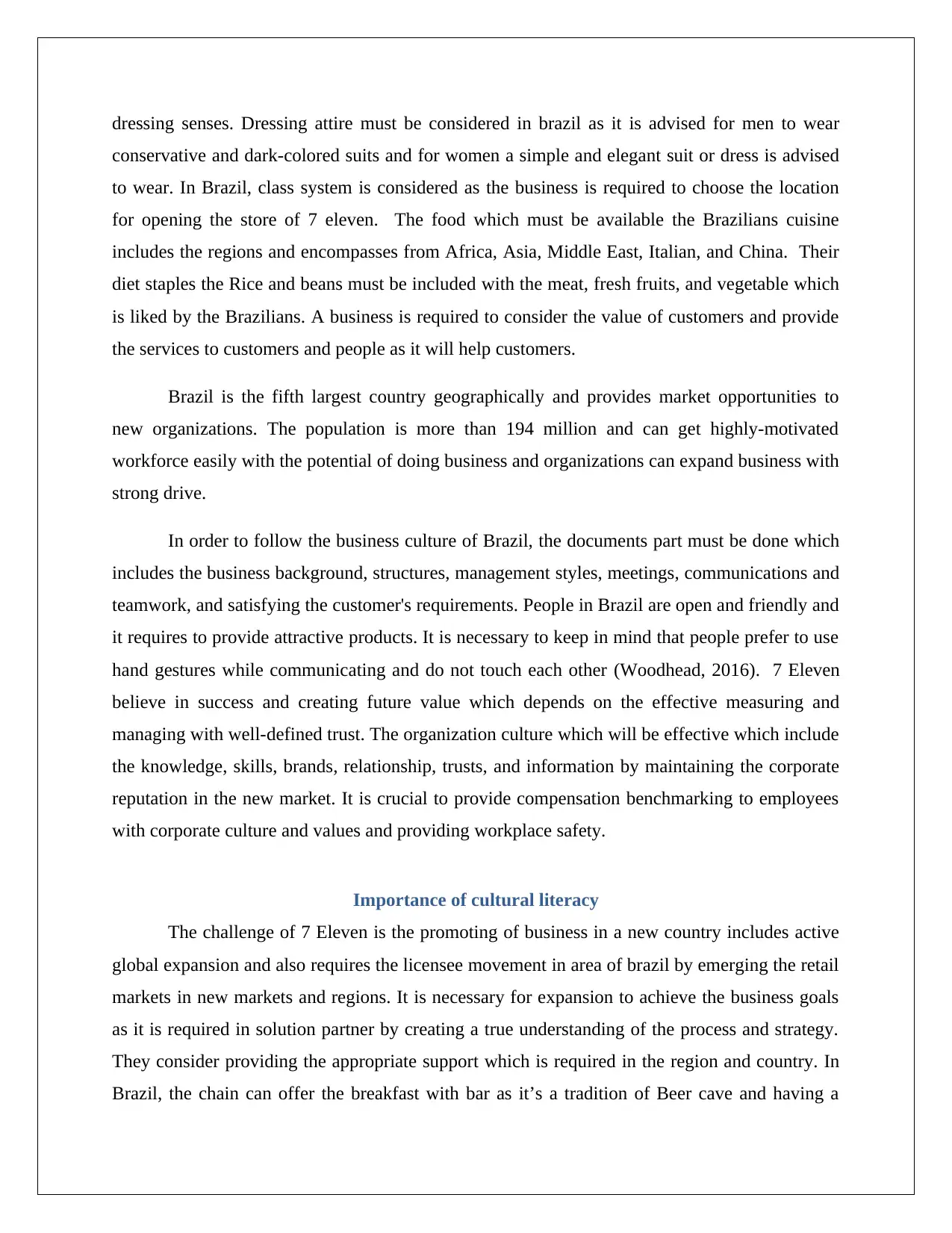
dressing senses. Dressing attire must be considered in brazil as it is advised for men to wear
conservative and dark-colored suits and for women a simple and elegant suit or dress is advised
to wear. In Brazil, class system is considered as the business is required to choose the location
for opening the store of 7 eleven. The food which must be available the Brazilians cuisine
includes the regions and encompasses from Africa, Asia, Middle East, Italian, and China. Their
diet staples the Rice and beans must be included with the meat, fresh fruits, and vegetable which
is liked by the Brazilians. A business is required to consider the value of customers and provide
the services to customers and people as it will help customers.
Brazil is the fifth largest country geographically and provides market opportunities to
new organizations. The population is more than 194 million and can get highly-motivated
workforce easily with the potential of doing business and organizations can expand business with
strong drive.
In order to follow the business culture of Brazil, the documents part must be done which
includes the business background, structures, management styles, meetings, communications and
teamwork, and satisfying the customer's requirements. People in Brazil are open and friendly and
it requires to provide attractive products. It is necessary to keep in mind that people prefer to use
hand gestures while communicating and do not touch each other (Woodhead, 2016). 7 Eleven
believe in success and creating future value which depends on the effective measuring and
managing with well-defined trust. The organization culture which will be effective which include
the knowledge, skills, brands, relationship, trusts, and information by maintaining the corporate
reputation in the new market. It is crucial to provide compensation benchmarking to employees
with corporate culture and values and providing workplace safety.
Importance of cultural literacy
The challenge of 7 Eleven is the promoting of business in a new country includes active
global expansion and also requires the licensee movement in area of brazil by emerging the retail
markets in new markets and regions. It is necessary for expansion to achieve the business goals
as it is required in solution partner by creating a true understanding of the process and strategy.
They consider providing the appropriate support which is required in the region and country. In
Brazil, the chain can offer the breakfast with bar as it’s a tradition of Beer cave and having a
conservative and dark-colored suits and for women a simple and elegant suit or dress is advised
to wear. In Brazil, class system is considered as the business is required to choose the location
for opening the store of 7 eleven. The food which must be available the Brazilians cuisine
includes the regions and encompasses from Africa, Asia, Middle East, Italian, and China. Their
diet staples the Rice and beans must be included with the meat, fresh fruits, and vegetable which
is liked by the Brazilians. A business is required to consider the value of customers and provide
the services to customers and people as it will help customers.
Brazil is the fifth largest country geographically and provides market opportunities to
new organizations. The population is more than 194 million and can get highly-motivated
workforce easily with the potential of doing business and organizations can expand business with
strong drive.
In order to follow the business culture of Brazil, the documents part must be done which
includes the business background, structures, management styles, meetings, communications and
teamwork, and satisfying the customer's requirements. People in Brazil are open and friendly and
it requires to provide attractive products. It is necessary to keep in mind that people prefer to use
hand gestures while communicating and do not touch each other (Woodhead, 2016). 7 Eleven
believe in success and creating future value which depends on the effective measuring and
managing with well-defined trust. The organization culture which will be effective which include
the knowledge, skills, brands, relationship, trusts, and information by maintaining the corporate
reputation in the new market. It is crucial to provide compensation benchmarking to employees
with corporate culture and values and providing workplace safety.
Importance of cultural literacy
The challenge of 7 Eleven is the promoting of business in a new country includes active
global expansion and also requires the licensee movement in area of brazil by emerging the retail
markets in new markets and regions. It is necessary for expansion to achieve the business goals
as it is required in solution partner by creating a true understanding of the process and strategy.
They consider providing the appropriate support which is required in the region and country. In
Brazil, the chain can offer the breakfast with bar as it’s a tradition of Beer cave and having a
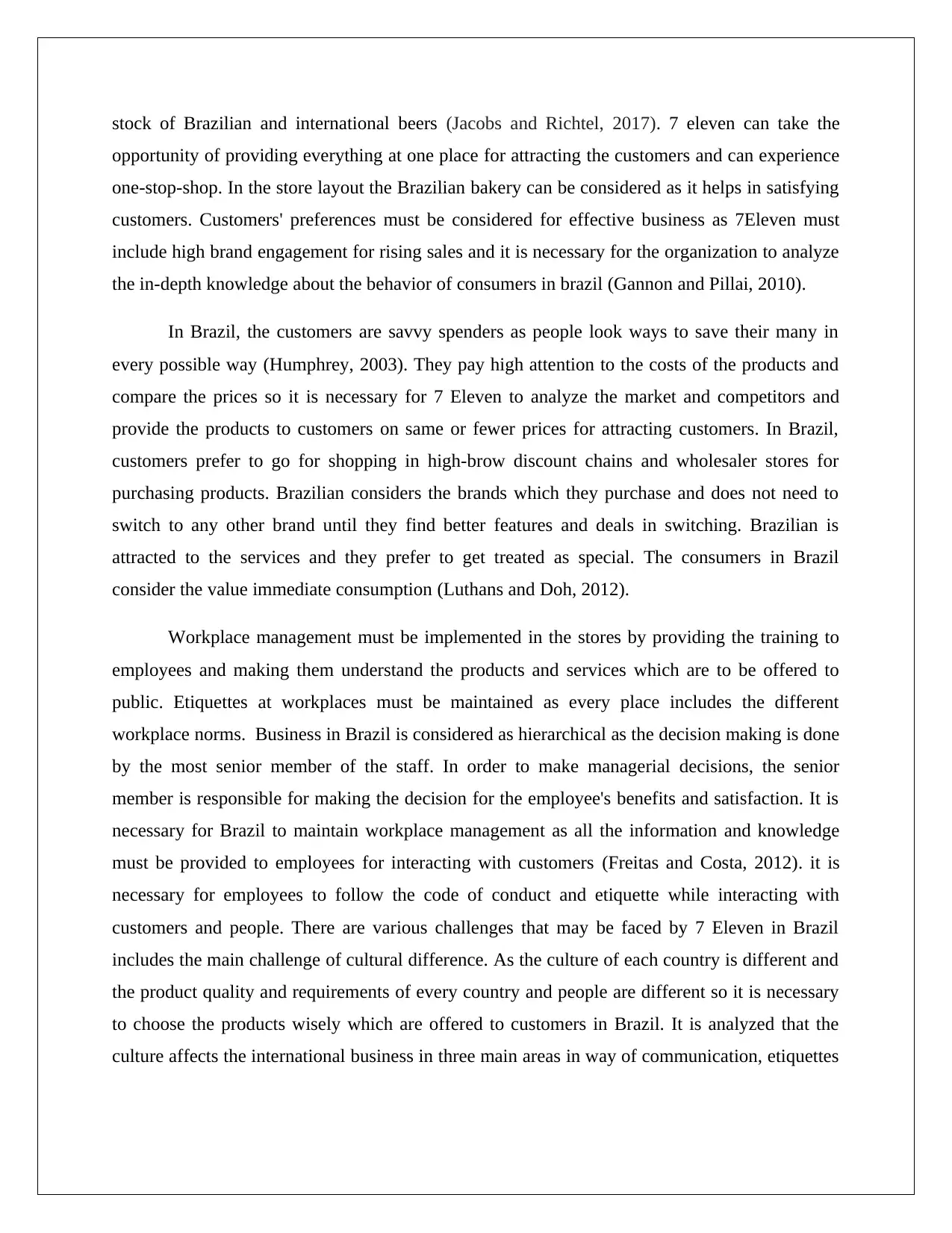
stock of Brazilian and international beers (Jacobs and Richtel, 2017). 7 eleven can take the
opportunity of providing everything at one place for attracting the customers and can experience
one-stop-shop. In the store layout the Brazilian bakery can be considered as it helps in satisfying
customers. Customers' preferences must be considered for effective business as 7Eleven must
include high brand engagement for rising sales and it is necessary for the organization to analyze
the in-depth knowledge about the behavior of consumers in brazil (Gannon and Pillai, 2010).
In Brazil, the customers are savvy spenders as people look ways to save their many in
every possible way (Humphrey, 2003). They pay high attention to the costs of the products and
compare the prices so it is necessary for 7 Eleven to analyze the market and competitors and
provide the products to customers on same or fewer prices for attracting customers. In Brazil,
customers prefer to go for shopping in high-brow discount chains and wholesaler stores for
purchasing products. Brazilian considers the brands which they purchase and does not need to
switch to any other brand until they find better features and deals in switching. Brazilian is
attracted to the services and they prefer to get treated as special. The consumers in Brazil
consider the value immediate consumption (Luthans and Doh, 2012).
Workplace management must be implemented in the stores by providing the training to
employees and making them understand the products and services which are to be offered to
public. Etiquettes at workplaces must be maintained as every place includes the different
workplace norms. Business in Brazil is considered as hierarchical as the decision making is done
by the most senior member of the staff. In order to make managerial decisions, the senior
member is responsible for making the decision for the employee's benefits and satisfaction. It is
necessary for Brazil to maintain workplace management as all the information and knowledge
must be provided to employees for interacting with customers (Freitas and Costa, 2012). it is
necessary for employees to follow the code of conduct and etiquette while interacting with
customers and people. There are various challenges that may be faced by 7 Eleven in Brazil
includes the main challenge of cultural difference. As the culture of each country is different and
the product quality and requirements of every country and people are different so it is necessary
to choose the products wisely which are offered to customers in Brazil. It is analyzed that the
culture affects the international business in three main areas in way of communication, etiquettes
opportunity of providing everything at one place for attracting the customers and can experience
one-stop-shop. In the store layout the Brazilian bakery can be considered as it helps in satisfying
customers. Customers' preferences must be considered for effective business as 7Eleven must
include high brand engagement for rising sales and it is necessary for the organization to analyze
the in-depth knowledge about the behavior of consumers in brazil (Gannon and Pillai, 2010).
In Brazil, the customers are savvy spenders as people look ways to save their many in
every possible way (Humphrey, 2003). They pay high attention to the costs of the products and
compare the prices so it is necessary for 7 Eleven to analyze the market and competitors and
provide the products to customers on same or fewer prices for attracting customers. In Brazil,
customers prefer to go for shopping in high-brow discount chains and wholesaler stores for
purchasing products. Brazilian considers the brands which they purchase and does not need to
switch to any other brand until they find better features and deals in switching. Brazilian is
attracted to the services and they prefer to get treated as special. The consumers in Brazil
consider the value immediate consumption (Luthans and Doh, 2012).
Workplace management must be implemented in the stores by providing the training to
employees and making them understand the products and services which are to be offered to
public. Etiquettes at workplaces must be maintained as every place includes the different
workplace norms. Business in Brazil is considered as hierarchical as the decision making is done
by the most senior member of the staff. In order to make managerial decisions, the senior
member is responsible for making the decision for the employee's benefits and satisfaction. It is
necessary for Brazil to maintain workplace management as all the information and knowledge
must be provided to employees for interacting with customers (Freitas and Costa, 2012). it is
necessary for employees to follow the code of conduct and etiquette while interacting with
customers and people. There are various challenges that may be faced by 7 Eleven in Brazil
includes the main challenge of cultural difference. As the culture of each country is different and
the product quality and requirements of every country and people are different so it is necessary
to choose the products wisely which are offered to customers in Brazil. It is analyzed that the
culture affects the international business in three main areas in way of communication, etiquettes
⊘ This is a preview!⊘
Do you want full access?
Subscribe today to unlock all pages.

Trusted by 1+ million students worldwide
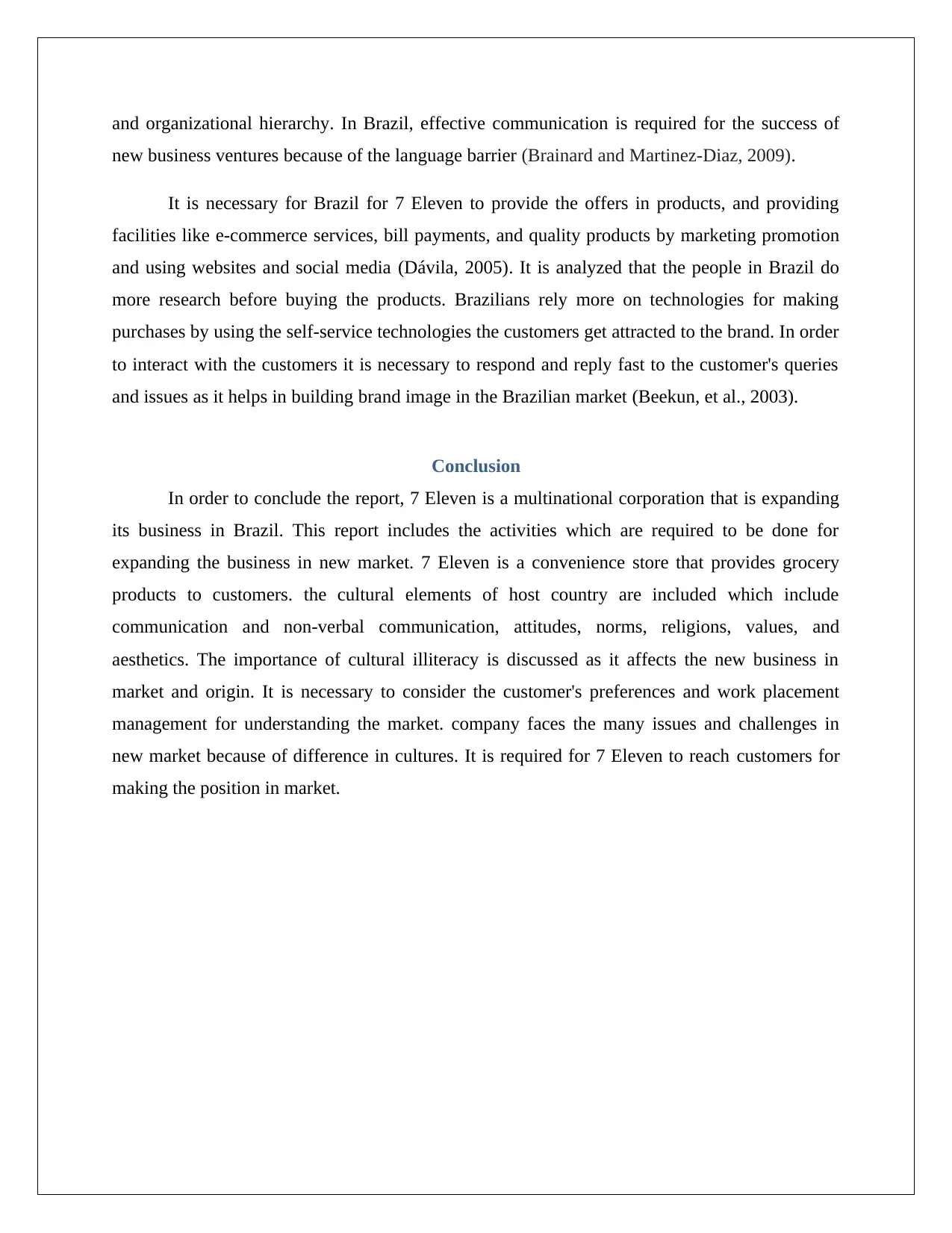
and organizational hierarchy. In Brazil, effective communication is required for the success of
new business ventures because of the language barrier (Brainard and Martinez-Diaz, 2009).
It is necessary for Brazil for 7 Eleven to provide the offers in products, and providing
facilities like e-commerce services, bill payments, and quality products by marketing promotion
and using websites and social media (Dávila, 2005). It is analyzed that the people in Brazil do
more research before buying the products. Brazilians rely more on technologies for making
purchases by using the self-service technologies the customers get attracted to the brand. In order
to interact with the customers it is necessary to respond and reply fast to the customer's queries
and issues as it helps in building brand image in the Brazilian market (Beekun, et al., 2003).
Conclusion
In order to conclude the report, 7 Eleven is a multinational corporation that is expanding
its business in Brazil. This report includes the activities which are required to be done for
expanding the business in new market. 7 Eleven is a convenience store that provides grocery
products to customers. the cultural elements of host country are included which include
communication and non-verbal communication, attitudes, norms, religions, values, and
aesthetics. The importance of cultural illiteracy is discussed as it affects the new business in
market and origin. It is necessary to consider the customer's preferences and work placement
management for understanding the market. company faces the many issues and challenges in
new market because of difference in cultures. It is required for 7 Eleven to reach customers for
making the position in market.
new business ventures because of the language barrier (Brainard and Martinez-Diaz, 2009).
It is necessary for Brazil for 7 Eleven to provide the offers in products, and providing
facilities like e-commerce services, bill payments, and quality products by marketing promotion
and using websites and social media (Dávila, 2005). It is analyzed that the people in Brazil do
more research before buying the products. Brazilians rely more on technologies for making
purchases by using the self-service technologies the customers get attracted to the brand. In order
to interact with the customers it is necessary to respond and reply fast to the customer's queries
and issues as it helps in building brand image in the Brazilian market (Beekun, et al., 2003).
Conclusion
In order to conclude the report, 7 Eleven is a multinational corporation that is expanding
its business in Brazil. This report includes the activities which are required to be done for
expanding the business in new market. 7 Eleven is a convenience store that provides grocery
products to customers. the cultural elements of host country are included which include
communication and non-verbal communication, attitudes, norms, religions, values, and
aesthetics. The importance of cultural illiteracy is discussed as it affects the new business in
market and origin. It is necessary to consider the customer's preferences and work placement
management for understanding the market. company faces the many issues and challenges in
new market because of difference in cultures. It is required for 7 Eleven to reach customers for
making the position in market.
Paraphrase This Document
Need a fresh take? Get an instant paraphrase of this document with our AI Paraphraser
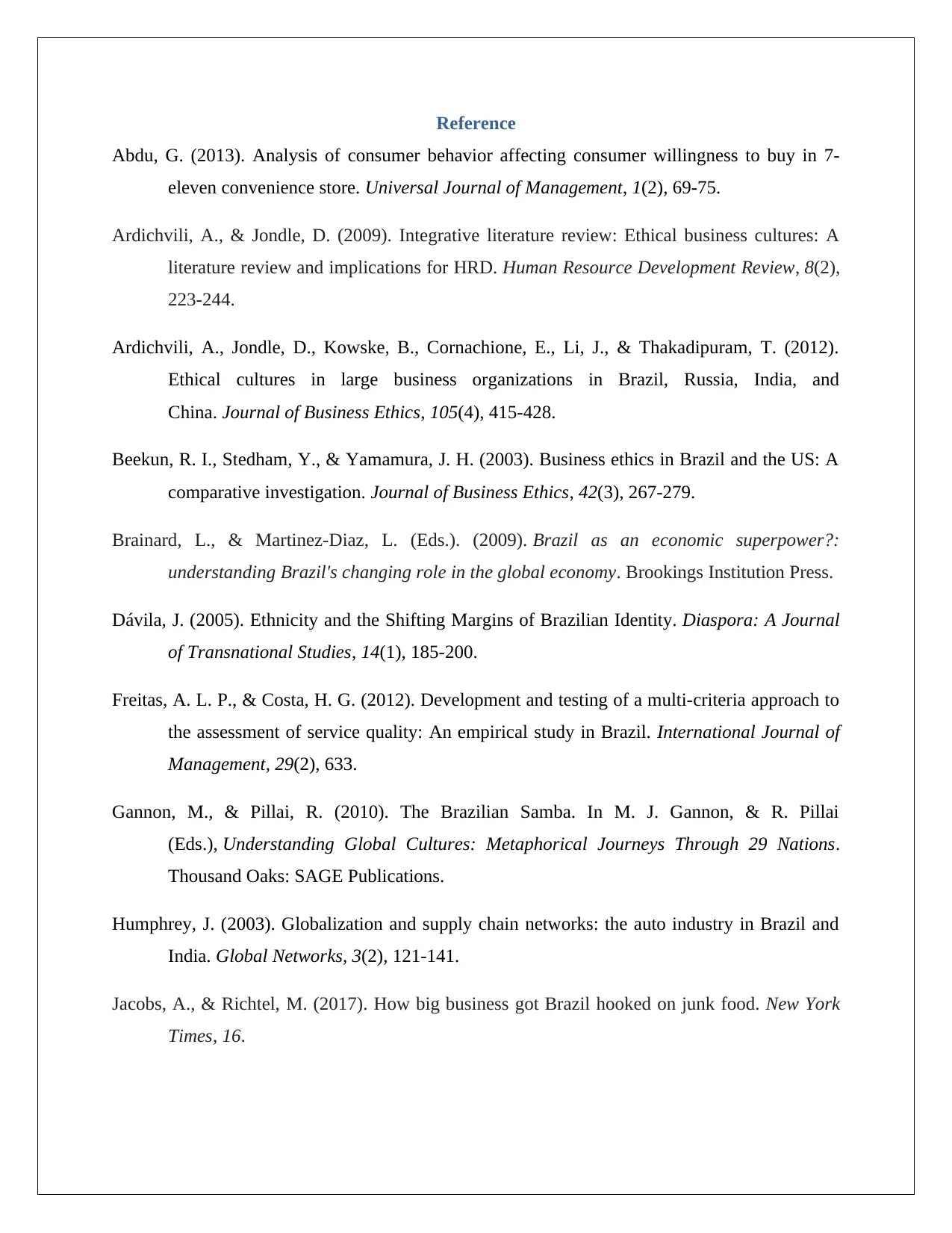
Reference
Abdu, G. (2013). Analysis of consumer behavior affecting consumer willingness to buy in 7-
eleven convenience store. Universal Journal of Management, 1(2), 69-75.
Ardichvili, A., & Jondle, D. (2009). Integrative literature review: Ethical business cultures: A
literature review and implications for HRD. Human Resource Development Review, 8(2),
223-244.
Ardichvili, A., Jondle, D., Kowske, B., Cornachione, E., Li, J., & Thakadipuram, T. (2012).
Ethical cultures in large business organizations in Brazil, Russia, India, and
China. Journal of Business Ethics, 105(4), 415-428.
Beekun, R. I., Stedham, Y., & Yamamura, J. H. (2003). Business ethics in Brazil and the US: A
comparative investigation. Journal of Business Ethics, 42(3), 267-279.
Brainard, L., & Martinez-Diaz, L. (Eds.). (2009). Brazil as an economic superpower?:
understanding Brazil's changing role in the global economy. Brookings Institution Press.
Dávila, J. (2005). Ethnicity and the Shifting Margins of Brazilian Identity. Diaspora: A Journal
of Transnational Studies, 14(1), 185-200.
Freitas, A. L. P., & Costa, H. G. (2012). Development and testing of a multi-criteria approach to
the assessment of service quality: An empirical study in Brazil. International Journal of
Management, 29(2), 633.
Gannon, M., & Pillai, R. (2010). The Brazilian Samba. In M. J. Gannon, & R. Pillai
(Eds.), Understanding Global Cultures: Metaphorical Journeys Through 29 Nations.
Thousand Oaks: SAGE Publications.
Humphrey, J. (2003). Globalization and supply chain networks: the auto industry in Brazil and
India. Global Networks, 3(2), 121-141.
Jacobs, A., & Richtel, M. (2017). How big business got Brazil hooked on junk food. New York
Times, 16.
Abdu, G. (2013). Analysis of consumer behavior affecting consumer willingness to buy in 7-
eleven convenience store. Universal Journal of Management, 1(2), 69-75.
Ardichvili, A., & Jondle, D. (2009). Integrative literature review: Ethical business cultures: A
literature review and implications for HRD. Human Resource Development Review, 8(2),
223-244.
Ardichvili, A., Jondle, D., Kowske, B., Cornachione, E., Li, J., & Thakadipuram, T. (2012).
Ethical cultures in large business organizations in Brazil, Russia, India, and
China. Journal of Business Ethics, 105(4), 415-428.
Beekun, R. I., Stedham, Y., & Yamamura, J. H. (2003). Business ethics in Brazil and the US: A
comparative investigation. Journal of Business Ethics, 42(3), 267-279.
Brainard, L., & Martinez-Diaz, L. (Eds.). (2009). Brazil as an economic superpower?:
understanding Brazil's changing role in the global economy. Brookings Institution Press.
Dávila, J. (2005). Ethnicity and the Shifting Margins of Brazilian Identity. Diaspora: A Journal
of Transnational Studies, 14(1), 185-200.
Freitas, A. L. P., & Costa, H. G. (2012). Development and testing of a multi-criteria approach to
the assessment of service quality: An empirical study in Brazil. International Journal of
Management, 29(2), 633.
Gannon, M., & Pillai, R. (2010). The Brazilian Samba. In M. J. Gannon, & R. Pillai
(Eds.), Understanding Global Cultures: Metaphorical Journeys Through 29 Nations.
Thousand Oaks: SAGE Publications.
Humphrey, J. (2003). Globalization and supply chain networks: the auto industry in Brazil and
India. Global Networks, 3(2), 121-141.
Jacobs, A., & Richtel, M. (2017). How big business got Brazil hooked on junk food. New York
Times, 16.
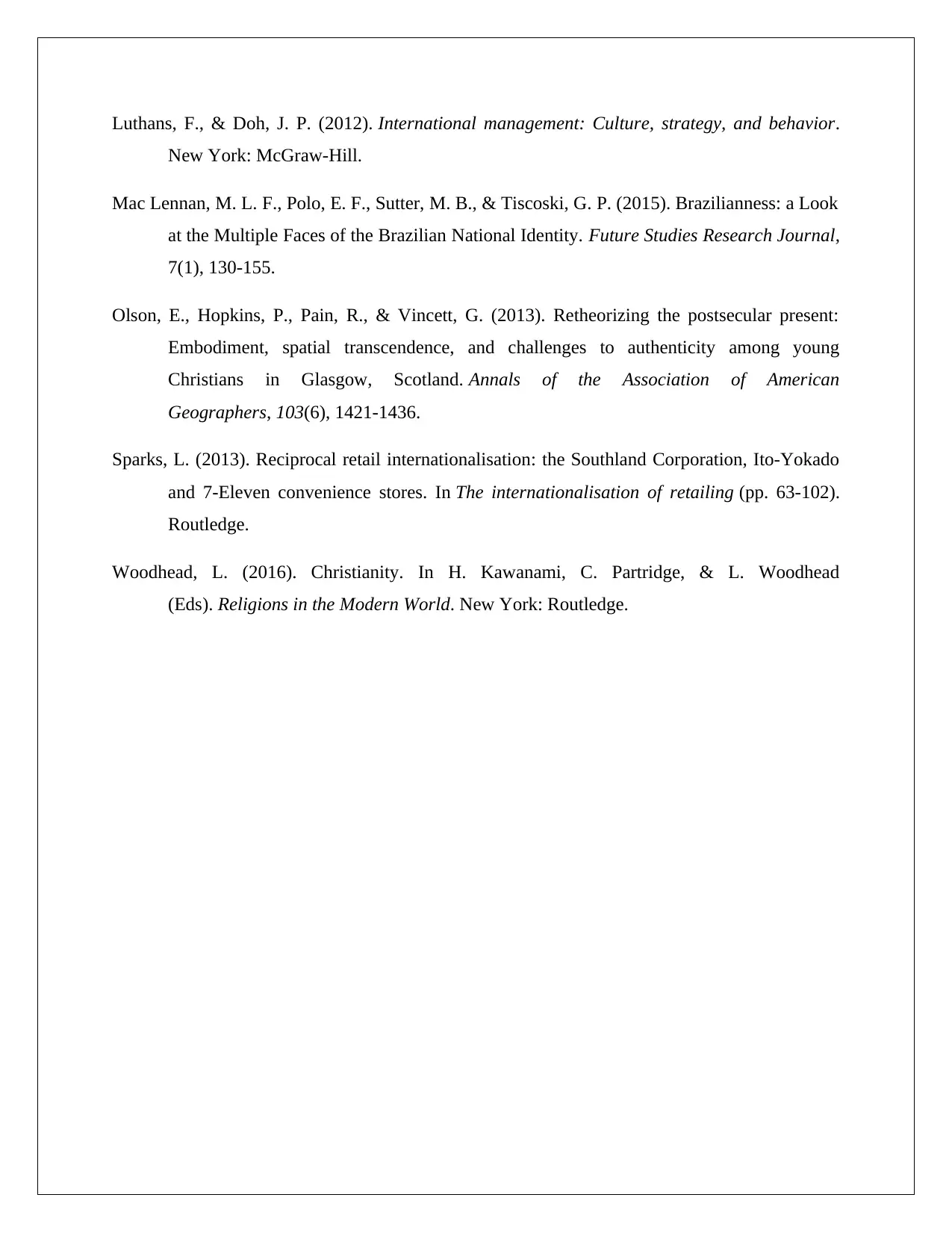
Luthans, F., & Doh, J. P. (2012). International management: Culture, strategy, and behavior.
New York: McGraw-Hill.
Mac Lennan, M. L. F., Polo, E. F., Sutter, M. B., & Tiscoski, G. P. (2015). Brazilianness: a Look
at the Multiple Faces of the Brazilian National Identity. Future Studies Research Journal,
7(1), 130-155.
Olson, E., Hopkins, P., Pain, R., & Vincett, G. (2013). Retheorizing the postsecular present:
Embodiment, spatial transcendence, and challenges to authenticity among young
Christians in Glasgow, Scotland. Annals of the Association of American
Geographers, 103(6), 1421-1436.
Sparks, L. (2013). Reciprocal retail internationalisation: the Southland Corporation, Ito-Yokado
and 7-Eleven convenience stores. In The internationalisation of retailing (pp. 63-102).
Routledge.
Woodhead, L. (2016). Christianity. In H. Kawanami, C. Partridge, & L. Woodhead
(Eds). Religions in the Modern World. New York: Routledge.
New York: McGraw-Hill.
Mac Lennan, M. L. F., Polo, E. F., Sutter, M. B., & Tiscoski, G. P. (2015). Brazilianness: a Look
at the Multiple Faces of the Brazilian National Identity. Future Studies Research Journal,
7(1), 130-155.
Olson, E., Hopkins, P., Pain, R., & Vincett, G. (2013). Retheorizing the postsecular present:
Embodiment, spatial transcendence, and challenges to authenticity among young
Christians in Glasgow, Scotland. Annals of the Association of American
Geographers, 103(6), 1421-1436.
Sparks, L. (2013). Reciprocal retail internationalisation: the Southland Corporation, Ito-Yokado
and 7-Eleven convenience stores. In The internationalisation of retailing (pp. 63-102).
Routledge.
Woodhead, L. (2016). Christianity. In H. Kawanami, C. Partridge, & L. Woodhead
(Eds). Religions in the Modern World. New York: Routledge.
⊘ This is a preview!⊘
Do you want full access?
Subscribe today to unlock all pages.

Trusted by 1+ million students worldwide
1 out of 9
Related Documents
Your All-in-One AI-Powered Toolkit for Academic Success.
+13062052269
info@desklib.com
Available 24*7 on WhatsApp / Email
![[object Object]](/_next/static/media/star-bottom.7253800d.svg)
Unlock your academic potential
Copyright © 2020–2026 A2Z Services. All Rights Reserved. Developed and managed by ZUCOL.





